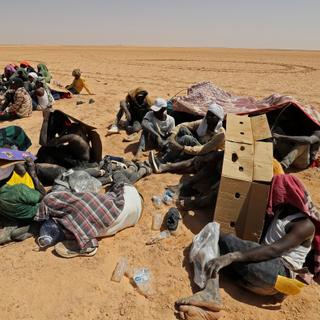


How EU funds enable North African countries to push back Europe-bound migrants into the desert
InvestigationAn investigation carried out by Le Monde, Lighthouse Reports and seven international media outlets found that migrants are being arrested by the hundreds and deported to desert areas in Morocco, Tunisia and Mauritania. Human rights are being violated with the backing of the European Union's resources.
In Rabat, the capital of Morocco, Lamine, a young Guinean, was arrested six times by the police in 2023 before being ruthlessly sent back to the other side of the country. (People mentioned in this investigation by a first name only requested anonymity.) In Mauritania, Bella and Idiatou, also Guinean, were abandoned in the middle of the desert after being arrested and then imprisoned. Their crime? Attempting to reach Spain by sea. In Tunisia, François, from Cameroon, found his way as best he could after the security forces abandoned him in the middle of the mountains near the border with Algeria. It was the third time he had been deported in the space of a few months.
These three stories are strikingly similar. Yet they took place in three different North African countries. The three countries share a common characteristic. They are each one of the final stages of the main migration routes to Europe: the Central Mediterranean route, linking the Tunisian coast to the Italian island of Lampedusa; the Western Mediterranean route, from North Africa to Spain; and the Atlantic route, from the shores of Senegal and the Western Sahara to the Canary Islands.
Significant resources mobilized by the EU
For this reason, Morocco, Tunisia and Mauritania are the focus of much attention from the European Union (EU), as the bloc carries out its policy to combat unauthorized immigration. At a time when public opinion is tense, member states are divided and the political agenda is dominated by the rise of the far-right in many countries, Europe is mobilizing substantial resources to prevent sub-Saharan migrants from reaching the sea. The risk is that the aid provided to the governments of these North African countries is used for illegal practices and repeated human rights violations.
Since 2015, the three countries have received over €400 million for border management through the Emergency Trust Fund (EUTF) alone, which was launched by the EU at the Valletta migration summit in Malta. In addition, certain member states have also been granted aid directly or through other programs.
In July 2023, the EU signed another agreement with Tunisia, which includes €105 million in aid to combat unauthorized immigration. Shortly before, on June 19, French Interior Minister Gérald Darmanin had pledged more than €25 million to Tunis to strengthen migration control. More recently, on February 8, 2024, in Nouakchott, European Commission President Ursula von der Leyen announced a €210 million aid package for Mauritania, part of which would be allocated to "migration management."
You have 88.21% of this article left to read. The rest is for subscribers only.
